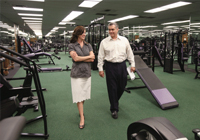What are healthy habits? What are the benefits of these habits? Being physically active, eating well, and avoiding harmful substances lead to benefits of better mental, physical and emotional health. You feel more positive, energized and ready to come up with solutions to life’s problems more easily. Changing your mindset to develop healthy habits is challenging. Your unique motivation and ways of creating these habits will lead to five benefits.
Control Your Weight
Managing calories and eating a healthy diet helps control weight. A healthy breakfast is the most important meal which can stop you from becoming overly hungry during the day and overeating later or resorting to fast food. Regular physical activity combined with the right meals can help you avoid excess weight gain. Even if your goal is not losing weight, physical activity can boost your immune system, keep you energized and improve cardiovascular health. Do at least 150 minutes of moderate physical activity every week–such as walking or taking the stairs instead of the elevator. Avoid sodas and fruit juices that are high in calories, and incorporate more fruits and vegetables into your daily meals and as snacks. The high level of water and nutrients and low calorie density help weight control.
Improve Your Mood
Doing right by your body pays off for your mind as well. The Mayo Clinic notes that physical activity stimulates the production of endorphins. Endorphins are brain chemicals that leave you feeling happier and more relaxed. Eating a healthy diet, as well as being physically active, will improve your fitness level. You’ll feel better about your appearance, which can boost your confidence and self-esteem. Short-term benefits also include decreased stress and improved cognitive function. Besides daily activity and healthy eating habits, social connections are a key habit that can lead to better mental and physical health. Emotional well-being is boosted through a number of additional activities, such as volunteering, acts of kindness, forgiving, practicing gratitude, and doing hobbies. Spending time with positive people and people you love, your friends, and family, will not only improve your mood, but also your physical health and boost your longevity.
Prevent and Treat Diseases
Healthy habits can help you prevent and treat high blood pressure, heart disease, diabetes, and depression, among other chronic disease–also called lifestyle related diseases. Inflammation in your body that can lead to cancer, arthritis and many other conditions is lowered through a plant based whole food diet and daily physical activity.
Power-Up Your Energy Level
We all want to take a nap after eating unhealthy food. When eating a healthy diet, the body receives the fuel to manage our energy levels and keeps us awake. Vegetables, fruits, legumes whole grains are the main components of a healthy diet. Eliminating red meat and weaning down other animal protein, while increasing plant based whole foods is key. Doing regular physical activity also improves muscle strength and boost energy levels. Your cardiovascular system will work more efficiently, because of the oxygen delivered more efficiently, so you have more energy to tackle and fully enjoy life.
Insufficient sleep can cause variety of problems such as bad mood and tiredness. It can also be responsible for high blood pressure, heart disease and diabetes. Having a schedule for waking up and going to bed at the same time every day will improve sleep quality. Maintaining cool room temperature at night, getting enough sunlight during the day, avoiding alcohol and large meals late in the day, getting physical activity earlier in the day, and keeping device screens out of the bedroom will help you get to sleep. Feeling emotionally well will also help you avoid early morning awakenings.
Increase Your Lifespan
When you practice healthy habits, you boost your chances of a longer life. The American Council on Exercise reported on an eight-year study of 13,000 people. The study showed that those who walked just 30 minutes each day significantly reduced their chances of dying prematurely, compared with those who exercised infrequently. Looking forward to more time with loved ones is reason enough to keep walking. Start with short five-minute walks and gradually increase the time until you’re up to 30 minutes.
The Outcome
When you start adopting healthier lifestyle, you will feel the benefits in a myriad of ways. Healthy habits help you improve your physical appearance, physical and mental health, and emotional state, and keep you energized. Be patient. Start with small steps. Do what you can confidently do. Gradually build up until you reach your healthy lifestyle goals. These habits are lifetime supports to the only place you live: your body. This holiday season give yourself a gift of self-love by doing what you can for your health and happiness now! Start by savoring the joys of the holidays!
Raisins are one of the most consumed dried fruits not just because they have a refreshing and sugary taste but because there are many healthy benefits stored in the form of concentrated nutrients.
Consuming all kinds of fruit is very good for your health, but according to a study done by the University of Connecticut, dried fruit (such as raisins) has more calories that can help you consume less other types of food that is unhealthy. It can help you lose weight, as long as you eat dried fruit sparingly.
Here are a few reasons to include raisins in your regular menu:
Raisins are a lower glycemic index choice.
They have low-to-moderate glycemic index which is makes them a better snack choice for people with diabetes, compared with higher glycemic index foods, such as processed, sugary foods. According to some studies, raisin consumption can lower the insulin response in those with diabetes and can help regulate your sugar absorption.
Raisins can help prevent heart disease.
According to some studies, raisin consumption can lower the levels of serum low-density lipoprotein cholesterol (bad cholesterol) and triglyceride levels, which usually are linked to developing heart diseases. Also raisin consumption can be related to low oxidative stress and reduction of oxidative biomarkers that increase in persons with heart disease.
Raisins can help you lose weight (if eaten in moderation).
As we previously mentioned raisin consumption can lead to satiety or a feeling of fullness which can reduce consumption of other food and help you lose weight. This works, as long as you are careful the amounts you eat. (Dried fruit is higher in calories than fresh fruit.) They are a potential good snack choice for kids, as well as adults, to satiate the dessert cravings.
Raisins can make your bones stronger.
One cup of raisins a day equals the recommended calcium daily intake, and can help you prevent arthritis and osteoporosis. Also raisins contain the micronutrient – boron that helps you in the calcium absorption. Of course, you need to lower your intake of other calorie dense foods to offset eating a cup of raisins.
Raisins are a good choice in treating infections.
They contain polyphenols with anti bacterial and anti inflammatory properties which makes them effective choice while threatening infections
Raisins can help you prevent cancer.
Even though it may sound strange raisins are very rich in antioxidants which can prevent your cells from free radical damage which helps in preventing cancer. Specifically this means they are rich in a polyphenolic antioxidant called catechin that, in many cases, is known as a protector against cancer.
Ask yourself: how does it feel when someone tries to control what you do? Being controlled is no fun—and that’s why we naturally tend to push back. That includes actions that loved ones want us to take to better our health.
Relationships Suffer When We Look to Control Others
For example your attempts to help your spouse eat healthy food may lead him to eat more unhealthy food—just to spite you. In relationships, you can either have control over others, or you can have their love—not both. And because love is such a basic human need, being overly controlling isn’t good for happiness. Another reason that being overly controlling of others lowers happiness is the tendency to get angry and frustrated when others don’t behave the way you want them to.
Needing Control Over Others Can Lead to Unhappiness
In one study, a group that had a high need for control and another group that had a low need for control were both asked to make an unprepared speech to two audiences. The audience reacted positively to one group, but reacted negatively to the other. When the audience was positive, both those with a high and a low in need for control felt happy–not surprisingly. But when the audience was negative, those high in need for control found it to be far more disturbing, and felt much more badly than those low in need for control. This result suggests that, seeking control over others can lead you to feel angry, frustrated, and disappointed when they don’t behave the way you want them to.
Bad Decisions Can Result from Controlling Others
The drive to control others not only pushes others’ love away, but can also lead to bad decisions. We make our best decisions when we hear a variety of viewpoints. When we’re overly controlling of others, our decision-making suffers…because we drive away those who disagree with us and tend to only hang out with the “yea-sayers.”
Which Personality Types Need to Pay Attention to Their Control Needs?
How does personality play into this idea? Those who prefer a “judging” approach to the world (J in the fourth letter) tend to plan more and might have a greater need for a sense of control over the outside world. Those who prefer the “perceiving” approach to life like to be spontaneous and have an easier time “going with the flow.” Of course, we all have a certain amount of human need for control! Being self-aware about your control needs might pave the way for a smoother ride through life. To increase our happiness levels, we can all benefit from “letting go” of the need to control others.
HealthTypeLLC, now officially registered as a company, has been collaborating to develop a program for preventing and treating conditions such as diabetes and heart disease. Healthy eating, physical activity, adequate high quality sleep, avoiding risky substance use, managing stress, getting social support and love are all the cornerstones for achieving health and longevity. Sometimes life, stress, unhappiness, and a hectic schedule get in the way. Dr. Lianov likes to say that first focusing on your mood and emotional well-being will help you address the “cause of the cause of the cause” of chronic disease. Therefore a major focus of the new program will be helping participants boost their emotional well-being. Please stay tuned for updates, as developments of this exciting new program unfold!
HealthTypeLLC blog has been on a hiatus over the past couple of years. We continued to be active on FB and Twitter and appreciate the many new followers over recent months. We are gearing up to come back in full swing with a brand new website and web-based app focused on happiness at myhappyavatar.com later this fall. The myhappyavatar site will also offer a new blog series on how to use the new app, success stories from users, and articles by guest experts in the field of positive psychology.
This blog will continue to focus on developments of the application of the HealthTypeLLC model and tips about how you can boost your happiness and health by keeping your personality preferences and brain strengths in mind! We’ll also include special guidance and advice for coaches, trainers and providers.
Please stay tuned!
You get energized by things that you can fully understand and define. You achieve healthy habits with a practical, flexible plan and solving problems along the way.
Take time alone to help find your motivation for change based on logical reasoning. Seek hands-on direct experience to prepare for making the change.
Assure your plan has outlines the step-by-step actions needed to achieve your goal, allows for spontaneity. Include activities that excite the senses and offer enjoyable sensations. Get a good grasp about how these activities have a place in your life.
Set up external reminders, such as walking/running shoes by the door. When you do an activity, focus totally on the present moment and the external reality. For example note how your muscles feel or eat mindfully, paying attention to the textures, sounds, and tastes in your mouth. Savior those moments. Try different activities at varying times throughout the week so you don’t get bored.
Reflect on practical solutions if you encounter barriers. Use your natural ability to figure things out and overcome hurdles along the way. Engage in solitary activities to regain energy. If you have a setback, consider whether you gave yourself enough flexibility and spontaneity in your plan. To keep things interesting, use your natural skill at being spontaneous to substitute an activity or food with new healthy ones. Use trial and error to see which one can get you on track.
You get energized by fully experiencing your senses and bodily sensations in the moment. You can achieve healthy habits through realistic pursuit of practical, adaptable, and fun goals.
Commit to making a health and happiness habit based on the logical rationale behind the intended habit. Make sure you understand how the specific change fits with who you are and your goals. Learn any necessary new skills with hands-on, direct experience. Set concrete, achievable goals. Spell out the concrete steps in the plan. But leave the schedule open-ended, but stick to your overall goal. Consider competitive sports and activities in high energy action-packed settings. Choose healthy meals that give you a sense of adventure and that are attractive.
As you start to do the activities in the plan, reinforce the new activity by emphasizing spontaneous activities that excite the senses. Interact with the outside world as much as possible to gain the energy to sustain the habit—as long as you can stay focused. If you encounter setback, you are naturally adept at solving problems or challenges “in the moment.” Get help from a buddy or mobile app to remind you stay on task and be accountable.
If you have a setback, make sure you understand what happened. Did something unusual get in the way? Identify ways to overcome barriers and be prepared to use them “in the moment” as soon as you notice you are getting off track. Always look for practical solutions to obstacles. Hands-on, trial-and-error methods of problem-solving will likely work best for you. Set up external cues to stay on track.
You are energized and engaged most when you can recall detailed memories from the recent or distant past. You can achieve healthy habits through a consistent plan that fosters service to others, as well as helping yourself.
Learn new information and skills to prepare for change by making connections between intended habit and the practical knowledge and skills you already have. Get energized for the habit change by doing refreshing reflective and solitary activities. Connect your goal with important people in your life and ways to create harmony and affirm them.
Prepare well. Obtain all of the necessary facts and details about how to accomplish your goal. Assure the safety of your plan by learning correct techniques and getting familiar with the fitness center. Understand how the change can be integrated into your routine and define your specific expectations as a result of the change.
Develop a scheduled plan with small, concrete and sequential steps that lead to the ultimate goal. Make sure your plan is detailed, accurate and precise and that you have addressed all of the necessary steps and how-to’s. Find ways to involve others in your activities so that you are supporting and affirming each other in pursuing your health goals.
As you proceed with your plan, pay attention to the details of each experience while doing the steps in your plan. Commit the details to memory, such as locations of healthy items at the grocery store. This helps the new routine become familiar and comfortable.
Reinforce your new habit by recalling detailed memories of enjoyable and positive sensations and experiences with activities similar to the new activity, such as enjoying tasty fruit salad or the bodily sensations when running. If you encounter setbacks, review the details of what happened. Did you were chose activities you were confident you could do? Revise your plan accordingly and make sure you have a concrete, step-by-step plan. The latter will help you succeed.
You get energized by interacting with others and affirming their actions. You can achieve healthy habits by cooperating with others to help them, as well as yourself. Use a buddy or coach to help draw out and clarify your motivation and your decision to make a change.
As you learn the skills for your new habit, reflect on what works and what feels good. Connect new information with past positive experiences with actions similar to your goal. Remember how your role models and other important people have made similar changes. How can the change bring you closer to people who are important to you? How can you involve others so that you can support and show you appreciate each other?
More than many other personalities, you will need to anticipate conflicts others as a result of making a change. Talk to him or her about ways you can adjust the plan to reach an agreement. As you begin to do the activities in your action plan, make sure your plan has a clear purpose, is scheduled and is broken into very specific steps that can achieved efficiently. Recall the step-by-step details of what has worked for you in the past and include them now.
If you encounter setbacks, talk to family and important people in your life and get support, especially for practical needs (such as watching the kids while you go to the gym). Share your new understanding with others who are doing similar activities so that you can be supportive of each other. Make sure to revise the plan with specific steps that have worked for you or someone else in the past.
You get energized by paying attention to your insights and sense of what is right for yourself. You can achieve healthy habits through your drive to pursue self-improvement and move closer to your health vision.
Spend time alone to draw out your insights about your goal or intended habit change and identify solutions to potential barriers. What do you know will best help achieve your goals? Turn to a coach or trusted someone who can draw out your commitment to making the change based on objective data.
Design an action plan that allows you to feel in control of and organize your surroundings to accommodate your new habit. Use precise language in your structured plan so that you are clear about how each step will lead to the next to reach your ultimate goal. Include challenges that promote self-mastery.
Stick with your plan, by taking solitary time to reflect on what is going well and positive hunches about your choices. Reinforce your commitment by focusing on the fact that you know the change is right for you. What is your insight about the consequences of making a habit change? Review the science behind the health habit you are thinking about. Figure out the logic and objective rationale that supports the change. Ask your doctor and other experts for resources to read and further consider.
While performing physical activities, focus internally to energize yourself. Read or concentrate on something else during repetitious activities. Choose foods that you feel are right for your body. Consider using a system that allows you to shop efficiently for healthy items. Look for rating scales of the health value of food. Set a regular visit with a good friend at a restaurant that serves some healthy options or meet at the farmer’s market.
If you encounter setbacks, consider how to organize your life or develop a system to help you succeed next time. Pay attention to the insights you have about how to get back on track. Use your insights about what went wrong how to get around that problem in your revised action plan.
Engage With Us

Participants
Join the unique group…

Health Coaches
Apply the unique framework…

Physicians and Health Professionals
Contribute to health behavior innovation

Partners
Collaborate on the application

Employers
Enhance your wellness programs

Get connected and stay up to date